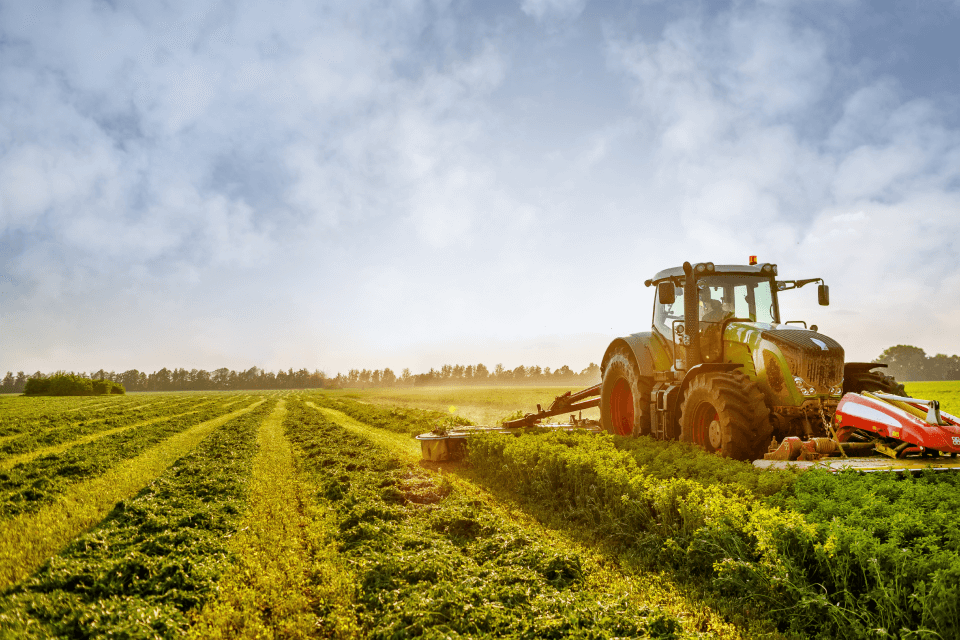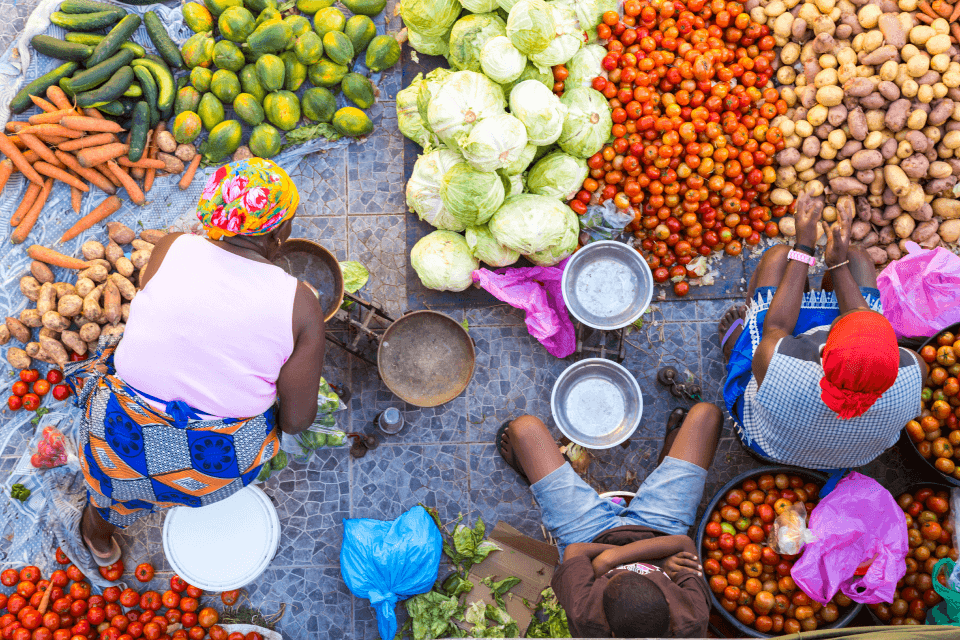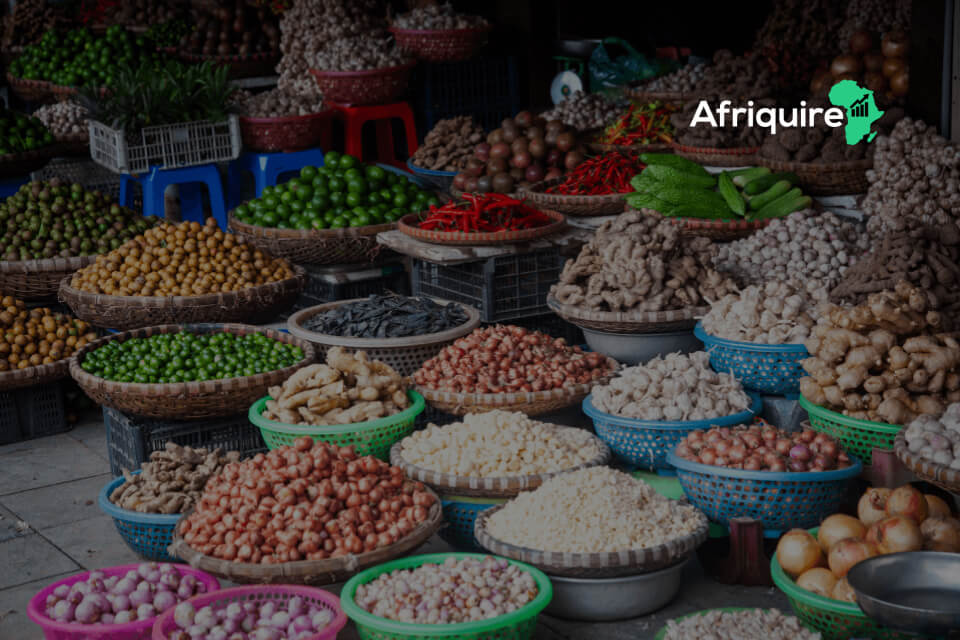- Introduction
- Introduction: The Importance of Agripreneurship in Africa’s Food Security
- The Connection Between Agripreneurship and Food Security
- Key Agripreneurship Initiatives Addressing Food Security
- The Impact of Agripreneurship on Local Food Systems
- Challenges and Opportunities in Strengthening Food Security Through Agripreneurship
- Frequently Asked Questions (FAQs)
- Conclusion
Introduction
Food insecurity is one of Africa’s major challenges. Agriculture is the continent’s backbone, and agribusiness is vital to guaranteeing a sustainable food supply. Agripreneurs—entrepreneurs combining innovation and farming—transform traditional agriculture into a profitable company through Agripreneurship.
The question is, what is the role of agripreneurship in African food security? Agripreneurs are driving change by introducing sustainable and innovative farming practices and establishing market connections. The significance of agripreneurship in African food security extends beyond meeting current feeding needs to ensure a stable food supply for future generations.
Introduction: The Importance of Agripreneurship in Africa’s Food Security
Africa’s agricultural sector has been the backbone of its economy, providing jobs and contributing to local and global food supplies. However, climate change, outdated farming practices, and poor infrastructure have hindered productivity. Agripreneurship—the fusion of agriculture, innovation, and entrepreneurship—offers solutions by boosting productivity and addressing food insecurity. Entrepreneurs are developing new farming methods, improving supply chains, and using technology to ensure food reaches every corner of Africa.
Overview of Agriculture’s Role in Africa’s Economy and its Link to Food Security.
Over 60% of Africa’s population relies on agriculture, making the sector vital to the continent’s economy and contributing significantly to GDP. From West Africa’s cocoa production to the coffee from East Africa, Africa has leveraged its fertile soils to fuel global markets. Beyond exports, agriculture supports local economies by providing livelihoods for millions.
Agriculture is also key to food security. Considering how fast populations grow, agriculture is the only means of meeting local needs. Food security ensures that farms can produce enough to meet local demands. However, weak agricultural systems could lead to food shortages (food insecurity), affecting millions of lives and livelihoods.
Definition of Agripreneurship and How it Combines Agriculture with Innovation and Entrepreneurship to Address Food Security Challenges.
Agripreneurship integrates agriculture, entrepreneurship, and innovation to solve real-world problems related to food production and distribution. Agripreneurs are not the kind of farmers you are probably used to. They are more interested in solving problems by combining sustainable farming practices with advanced technologies like AI, mobile apps, and data analytics. They aim to optimize the entire food supply chain, from farm to table, improving efficiency, reducing post-harvest losses, and increasing market access.
Agripreneurship also plays a crucial role in developing climate-smart farming practices, making agriculture more resilient across Africa’s diverse climates. Encouraging young people to embrace agripreneurship can unlock agriculture’s potential to drive development, improve food security, and strengthen the economy.
The Connection Between Agripreneurship and Food Security
Agripreneurship is emerging as a transformative force for food security in Africa. Agripreneurs—entrepreneurs in agriculture—are enhancing productivity, building efficient supply chains, and diversifying food sources by adopting innovation. This wave of innovation is poised to address Africa’s food challenges and drive economic progress significantly. Understanding how to start a successful agribusiness in Africa can empower more entrepreneurs to enter the sector, contributing to solutions for food security across the continent. The role of agripreneurship in African food security is vital, as these entrepreneurs reshape agriculture into a cornerstone of economic transformation for Africa.
Enhancing Agricultural Productivity
Agripreneurs significantly enhance food security by leveraging innovative farming techniques, advanced technology, and sustainable practices. Precision farming with drones, sensors, and AI tools for predicting crop yields indicates agricultural advancement.
Sustainable farming practices—such as crop rotation, organic fertilizers, and water-saving irrigation methods—ensure that Africa’s agricultural productivity can meet the needs of its growing population. Agripreneurs also introduce climate-resilient crops, ensuring a stable food supply despite climate change. These modern approaches are significantly boosting food production and helping reduce hunger and malnutrition across the continent.
Improving Access to Markets
Growing food is only the first step; getting it to markets is the next. Agripreneurs are critical in creating efficient supply chains that connect farmers directly to markets, reducing post-harvest losses. In Africa, post-harvest losses are massive, but agripreneurs use technologies like cold storage and digital marketplaces to address this issue.
They also enable faster, more affordable transportation from rural areas to urban centers, ensuring fresh produce is available at lower prices for urban consumers. This results in better prices for farmers and more accessible food for consumers. The role of agripreneurship in food security becomes clear as these entrepreneurs streamline logistics, minimizing waste and ensuring everyone has access to healthy food.
Diversifying Food Sources
Agripreneurs are transforming traditional farming by introducing new crops and livestock, diversifying agriculture. Instead of relying entirely on staple crops, they experiment with nutrient-dense crops such as sorghum and climate-resistant indigenous veggies.
This diversification contributes to a more robust agricultural system. If one crop fails, others can grow, providing a consistent food source. It improves food security and promotes healthier eating habits by bringing a larger range of foods to local markets. Agripreneurs also look at other protein sources, such as insect farming, to address future protein demand. These technologies make Africa’s food landscape more diverse, healthy, and resilient.
Creating Jobs and Economic Stability
Agripreneurship goes beyond food production. It creates jobs and drives economic growth. Agripreneurs employ the agricultural value chain, from farmhands to logistics and technology experts. In rural areas, where job opportunities are often scarce, agripreneurship offers a path to economic stability.
Higher incomes allow communities to afford better-quality food, improving food security. Agripreneurs also reinvest in their communities by building schools, clinics, and infrastructure, further supporting local development. By empowering individuals and boosting local economies, agripreneurship indirectly strengthens food security by giving people the financial means to feed their families.

Key Agripreneurship Initiatives Addressing Food Security
Agripreneurship is reshaping the fight against food security challenges across Africa. By leveraging innovation, sustainability, and collaboration, agripreneurs are transforming farming and food distribution. From cutting-edge technology to community-driven projects, these initiatives significantly impact agricultural productivity and food access. Let’s explore how agripreneurship is tackling African food security and how it is paving the way for a more sustainable future.
Agri-tech Startups
The rise of agri-tech startups is among the most interesting developments in African agripreneurship. These startups are revolutionizing agriculture with precision farming, smart irrigation systems, and drone technology.
Using data and technology, precision farming enables farmers to plant, irrigate, and harvest crops optimally, thereby increasing yields. Intelligent irrigation systems save water by delivering the exact quantity required. At the same time, drone technology allows farmers to monitor wide land areas, analyze crop health, and properly distribute fertilizers or pesticides.
Sustainable Farming Projects
Sustainable agricultural initiatives have been able to concentrate on long-term food security due to the impact of technology breakthroughs on innovation. To maintain land health, these projects prioritize organic farming, regenerative agriculture, and conservation practices. Organic farming eliminates harmful chemicals, ensuring healthier crops for consumers and the environment. Regenerative agriculture promotes afforestation while reducing water usage. It halts soil deterioration through techniques including crop rotation and reduced tillage to improve soil health, increase biodiversity, and climate resilience.
Community-based Agripreneurship
Community-based agripreneurship projects enable farmers, entrepreneurs, and organizations to work together to address food insecurity from the grassroots level. Examples of case studies:
- SokoFresh – Kenya
Founded by Denis Karema, Arpana Philip, and Paul Linden in 2018, SokoFresh introduced solar-powered cold storage units to smallholder farmers in Kenya, reducing post-harvest losses drastically. The storage units allowed farmers to extend the shelf life of perishable produce, access new markets, and sell their products at better prices.
- Farmcrowdy – Nigeria
Launched by Onyeka Akumah in 2016, Farmcrowdy is a digital platform connecting small-scale farmers with investors to increase agricultural inputs. Focused on ending food insecurity, the platform has supported over 25,000 farmers across Nigeria by providing funds, training, and market access. Farmcrowdy’s model boosts food production and improves the financial well-being of rural farmers.
These examples demonstrate how community-based agripreneurship can combat food insecurity through collaboration, resource-sharing, and innovation, ultimately building more resilient African food systems.
Partnerships with NGOs and Governments
Collaborations between agripreneurs, NGOs, and governments are critical for scaling initiatives and addressing food security on a broader scale. Examples of these partnerships are:
- One Acre Fund & Kenyan Government
In 2017, One Acre Fund collaborated with the Kenyan government to provide smallholder farmers with training, seeds, and credit. This effort helped boost food security for over 400,000 farmers.
- World Food Programme & Zambian Agripreneurs
In 2020, the World Food Programme worked with Zambian agripreneurs to implement drought-resistant farming techniques. This collaboration increased food production for 50,000 farmers in semi-arid regions of Zambia.

The Impact of Agripreneurship on Local Food Systems
Agripreneurship—entrepreneurship in agriculture has emerged as a powerful driver of innovation in African food systems. With the growing need to address food insecurity, improve local food production, and reduce reliance on imports, agripreneurs are transforming food production, distribution, and consumption. By leveraging technology, improving market access, and focusing on sustainability, these agricultural innovators are reshaping local food economies and bolstering the continent’s food security.
Reducing Food Imports
One major impact of agripreneurship is increased domestic food production, reducing import dependence. By investing in modern farming techniques, agripreneurs improve crop quality and quantity. This shift lessens the need to import food, conserving foreign exchange and strengthening local economies.
African countries could raise their food through agribusiness projects that include environmentally friendly farming methods tailored to their conditions. Using everything from drought-tolerant seedlings to creative irrigation techniques, agripreneurs develop solutions that boost domestic food production and promote resilience. This enables African nations to feed their people with food that is grown domestically, avoiding the price volatility linked to global market disruptions
Supporting Smallholder Farmers
Smallholder farmers are central to African agriculture but often lack access to the tools, financing, and markets needed to thrive. Agripreneurs are stepping in, providing these farmers with the resources they need for success. Through agritech platforms, smallholder farmers access modern equipment, high-quality seeds, and real-time weather data to improve their productivity.
Agripreneurs also help smallholder farmers overcome financial barriers by collaborating with microfinance institutions and agricultural banks to offer tailored loans. These loans enable farmers to invest in better tools and expand their production. Additionally, agripreneurs create supply chains linking small farmers to larger buyers, ensuring market access and enabling smallholder farmers to sell their produce at competitive prices.
Improving Food Distribution and Accessibility
Agripreneurs are transforming food logistics in Africa, ensuring that food reaches underserved and remote areas. Improving transportation, cold storage facilities, and digital platforms enable fresh, nutritious food to reach areas previously cut off from reliable supplies.
Technology plays a key role in streamlining food distribution. GPS-enabled trucks, mobile apps, and data-driven logistics systems reduce spoilage and food waste, increasing food availability in rural areas and urban slums. Agripreneurs also leverage e-commerce platforms, connecting consumers directly to farmers, shortening the supply chain, lowering prices, and improving farmers’ profits.
Promoting Nutrition and Health
In the fight to increase food production, agripreneurs also focus on improving food quality. They promote cultivating nutrient-dense crops, such as fruits, vegetables, and legumes, increasing the availability of healthy food options. This focus on nutrition helps combat malnutrition and improves health outcomes, especially in underserved regions where nutrient deficiencies are common.
Many agripreneurs are involved in public health campaigns that educate communities on the benefits of nutritious eating. Some develop fortified food products to address nutrient deficiencies like vitamin A and iron, while others set up community gardens where residents can grow their fresh produce. By prioritizing food security and nutrition, agripreneurs are helping improve African public health outcomes.

Challenges and Opportunities in Strengthening Food Security Through Agripreneurship
Access to Finance and Resources
In Africa, agribusiness owners frequently face difficulties obtaining capital and vital supplies. Small-scale farmers find it difficult to obtain traditional bank loans, which causes seasonal cash flow constraints that impede expansion. Nonetheless, crowdfunding websites and microfinance organizations are starting to be recognized as viable solutions. Smaller, more manageable loans are provided via microfinance, enabling agripreneurs to buy fertilizer, seeds, and other necessities. Farmers can also directly raise funds from investors and communities through crowdfunding.
Climate Change and Environmental Pressures
Climate change has increased droughts, floods, and soil degradation, which impact Africa’s agricultural sector. Agripreneurs are adopting innovative methods like precision farming, drought-resistant crops, and sustainable irrigation systems to combat these challenges. By implementing these solutions, agripreneurs can continue to produce food in difficult environments, contributing to food security while preserving the environment.
Adoption of Technology
Technology offers agripreneurs incredible opportunities to optimize their farming practices. Mobile platforms provide real-time information on market prices, crop conditions, and weather updates. Data analytics tools predict yields and identify optimal planting times, while AI automates tasks and enhances decision-making. Agripreneurs who adopt these technologies are more productive and resilient, playing a critical role in addressing food security.
Government Policies and Support
Government policies have the power to either encourage or hinder agripreneurship. Favorable policies, such as subsidies, tax incentives, and grants, reduce costs and provide the necessary infrastructure for agripreneurs to thrive. Governments prioritizing agricultural research, rural development, and food security initiatives create an environment where agripreneurship can flourish. Collaboration between governments and agripreneurs is essential to improving food security.
Scaling Agripreneurship Initiatives
While successful agripreneurship models exist in Africa, growing these initiatives across different regions presents challenges, such as limited infrastructure, varying climates, and local economic conditions. However, agripreneurs can achieve a broader impact and significantly contribute to food security through public-private partnerships, regional collaboration, and knowledge-sharing networks.
Agripreneurship holds immense potential in strengthening Africa’s food security. Despite challenges like funding, climate change, and scalability, innovation, collaboration, and supportive policies position agripreneurs to transform agriculture and ensure a sustainable food future for Africa.
Frequently Asked Questions (FAQs)
1. What is agripreneurship?
Agripreneurship refers to entrepreneurship in agriculture, focusing on innovative farming practices and business strategies.
2. Why is agripreneurship important in Africa?
Agripreneurship boosts food production, generates employment, and strengthens food security across the continent.
3. What are some examples of agripreneurship?
Examples include sustainable farming practices, agro-processing, and innovative food distribution models.
4. What challenges do agripreneurs face?
Agripreneurs often face limited access to funding, technology, and markets.
5. How can agripreneurs support rural communities?
By empowering local farmers, agripreneurs stimulate rural economies, providing better market access and promoting economic growth.
Conclusion
Agripreneurship is crucial in African food security, driving innovation, boosting local food production, and reducing import dependency. By fostering sustainable practices, agripreneurship increases food availability and creates employment opportunities, contributing to the development of entire communities.
Addressing challenges such as access to capital and technology is essential to utilize agribusiness’s contribution to food security in Africa effectively. Supporting agripreneurs can help strengthen Africa’s food systems, improve livelihoods, and create resilient economies.



